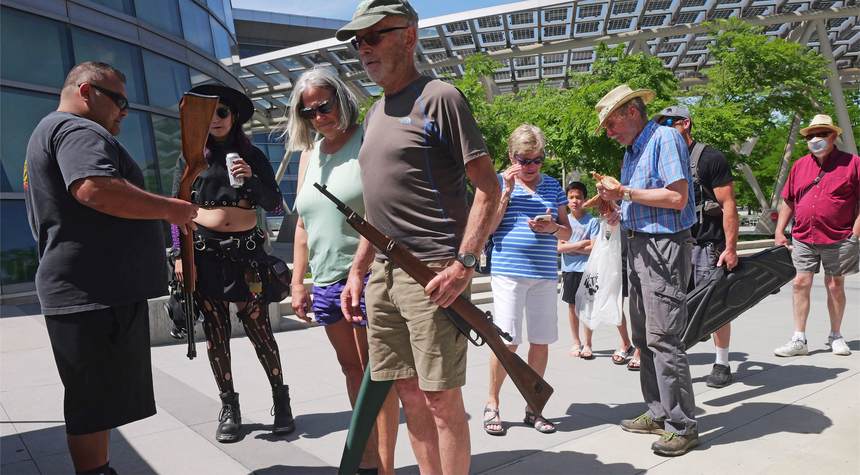Americans Stock up on Guns: 60 Million Firearms Sold in 2 Years During COVID-19 Pandemic
The COVID-19 pandemic brought about unprecedented changes in every aspect of American life, including a significant surge in gun ownership. According to a report from The Trace, a nonprofit news outlet that tracks gun violence, one-fifth of U.S. households purchased guns during the pandemic, resulting in more than 15 million Americans keeping firearms in their homes for the first time.
Americans purchased nearly 60 million guns between 2020 and 2022, with yearly sales running at about twice the level of 15 or 20 years ago. A NORC survey also revealed that between March 2020 and March 2022, 18 percent of households purchased firearms.
One of the notable changes in the type of guns being purchased is the shift from rifles to handguns, particularly semiautomatic handguns, which are kept in bedside tables, glove compartments, or carried on one’s person. This change in gun ownership reflects a growing trend towards self-defense and personal protection, especially during a time of uncertainty and fear brought about by the pandemic.
Many Americans, particularly first-time gun owners, bought guns to protect themselves and their families against the perceived threat of home invasion or other forms of violence during a time when they felt vulnerable.
This shift towards personal protection is evident in the fact that the buyers during the pandemic were more likely to be women, people of color, and renters, according to the NORC survey. The heightened crime rates that developed during the civil unrest following the murder of George Floyd might have also been a contributing factor.
The Hill’s report on The Trace’s data seemed to suggest that the increase in gun ownership has contributed to the uptick in gun deaths that occurred over the same time period.
“It’s a totally different type of gun ownership now,” said John Roman, a senior fellow in the Economics, Justice and Society Group at NORC, a nonpartisan research group at the University of Chicago. “It’s not a rifle stored away somewhere that you take out twice a year to go hunting. It’s a handgun, probably a semiautomatic handgun, that you keep in your bedside table or in your glove compartment, or that you maybe carry around with you.”
However, the article provided no evidence that the increase in legal gun purchases has contributed to the rise in gun violence. The fact that the vast majority of gun homicides are committed by individuals who illegally obtain their firearms seems to cast doubt on this contention.
This is news that would likely cause a screaming meltdown in the anti-gunner lobby, which is desperately trying to persuade Americans not to arm themselves. But for those who understand that the government cannot save you when you are in danger, this is a welcome development.
The increase in gun ownership during the pandemic highlights the exercise of Second Amendment rights by millions of Americans. The increase in gun sales reflects the exercise of this constitutional right by individuals who have chosen to purchase firearms for various reasons, including self-defense, recreational shooting, and collecting. This increase in gun ownership serves as a reminder of the importance of individual freedoms and the right to make choices about personal safety and security.
Moreover, the increase in gun ownership during the pandemic has also led to a diversification of gun owners. As mentioned earlier, first-time gun buyers during the pandemic were more likely to be women, people of color, and renters.
This diversification of gun ownership challenges the stereotype that gun ownership is limited to white men in the South who previously drank Bud Light. Indeed, I’m a black man who would never debase myself by consuming that swill, and I became a first-time gun owner during this time period. This data reflects a broader societal change in attitudes towards gun ownership.
Additionally, the increase in gun ownership during the pandemic has also led to a greater awareness of mental health and the need for proper training and education on firearm safety. Many first-time gun buyers recognized the importance of receiving training and education on safe handling, storage, and use of firearms. This increased awareness of firearm safety and the recognition of the connection between mental health and gun ownership can lead to more responsible gun ownership practices and help prevent tragic incidents involving firearms.
But one part of this development that I think is possibly the most important is that it reflects a much-needed change in mindset. It shows that more people are realizing that they cannot rely on the state for their protection. This means they are taking responsibility for their own lives. If they have changed their thinking on the role of the state in this area, perhaps this will lead more Americans to re-evaluate their trust in the government in other areas.





Post a Comment